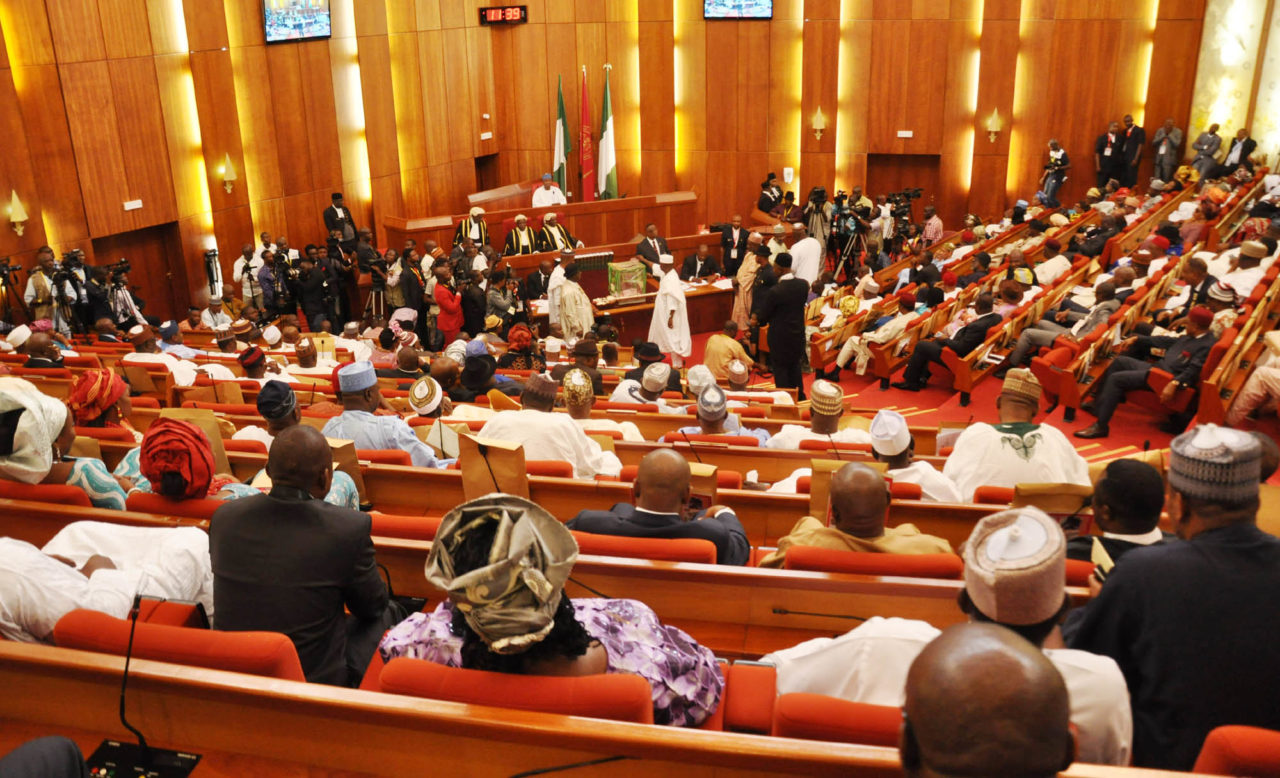 |
| Members of the House of Representatives at plenary |
The House of Representatives has proposed that the qualification for the chairmanship of the Economic and Financial Crimes Commission (EFCC) be raised from Commissioner of Police to Assistant Inspector-General of Police. The parliament also expanded the qualification to include a legal practitioner of no less than 20 years experience.
These are some of the amendments made to the EFCC (Establishment) Act, 2004, by the lower chamber of the National Assembly.
Four House bills seeking to amend the EFCC Act had been harmonised into one and it passed the third reading on Tuesday.
The passage followed the adoption of the report by the House Committee on Financial Crime, a copy of which our correspondent obtained at the weekend.
In the series of amendments to the Act, the lawmakers amended Section 2 of the EFCC Act relating to the composition of the commission.
Before the amendment, Section 2 read, “(1) the commission shall consist of the following members: (a) a chairman, who shall (i) be the Chief Executive and Financial Officer of the commission; (ii) be a serving or retired member of any government security or law enforcement agency not below the rank of Assistant Commissioner of Police or equivalent; and (iii) possess not less than 15 years cognate experience.”
After the amendment, it reads, “(a) A Chairman, who shall (i) be a retired or serving member of any government security or law enforcement agency not below the rank of Assistant Inspector-General (AIG) of Police or an equivalent and possessing not less than 20 years cognate experience; (ii) a legal practitioner with at least 20 years post-call experience.”
The Acting Chairman of the EFCC, Mr Ibrahim Magu, is a commissioner of police.
The House also removed the Secretary of the EFCC from tenured offices in the leadership of the commission.
On the qualifications to be considered in the appointment of the EFCC Secretary, a paragraph “e” was added to Section 8(1), which reads, “A person who is qualified to practise as a legal practitioner in Nigeria and has been so qualified for not less than 10 years.”
An amendment was also made to Section 27(4), making it compulsory for the EFCC to obtain ex-parte order from court before seizing suspected assets.
Also, the House deleted Section 1(2) relating to the Nigerian Financial Intelligence Unit, which has now been domiciled with the Central Bank of Nigeria as demanded by the EGMONT Group, from the EFCC Act.
These are some of the amendments made to the EFCC (Establishment) Act, 2004, by the lower chamber of the National Assembly.
Four House bills seeking to amend the EFCC Act had been harmonised into one and it passed the third reading on Tuesday.
The passage followed the adoption of the report by the House Committee on Financial Crime, a copy of which our correspondent obtained at the weekend.
In the series of amendments to the Act, the lawmakers amended Section 2 of the EFCC Act relating to the composition of the commission.
Before the amendment, Section 2 read, “(1) the commission shall consist of the following members: (a) a chairman, who shall (i) be the Chief Executive and Financial Officer of the commission; (ii) be a serving or retired member of any government security or law enforcement agency not below the rank of Assistant Commissioner of Police or equivalent; and (iii) possess not less than 15 years cognate experience.”
After the amendment, it reads, “(a) A Chairman, who shall (i) be a retired or serving member of any government security or law enforcement agency not below the rank of Assistant Inspector-General (AIG) of Police or an equivalent and possessing not less than 20 years cognate experience; (ii) a legal practitioner with at least 20 years post-call experience.”
The Acting Chairman of the EFCC, Mr Ibrahim Magu, is a commissioner of police.
The House also removed the Secretary of the EFCC from tenured offices in the leadership of the commission.
On the qualifications to be considered in the appointment of the EFCC Secretary, a paragraph “e” was added to Section 8(1), which reads, “A person who is qualified to practise as a legal practitioner in Nigeria and has been so qualified for not less than 10 years.”
An amendment was also made to Section 27(4), making it compulsory for the EFCC to obtain ex-parte order from court before seizing suspected assets.
Also, the House deleted Section 1(2) relating to the Nigerian Financial Intelligence Unit, which has now been domiciled with the Central Bank of Nigeria as demanded by the EGMONT Group, from the EFCC Act.
In this article:
